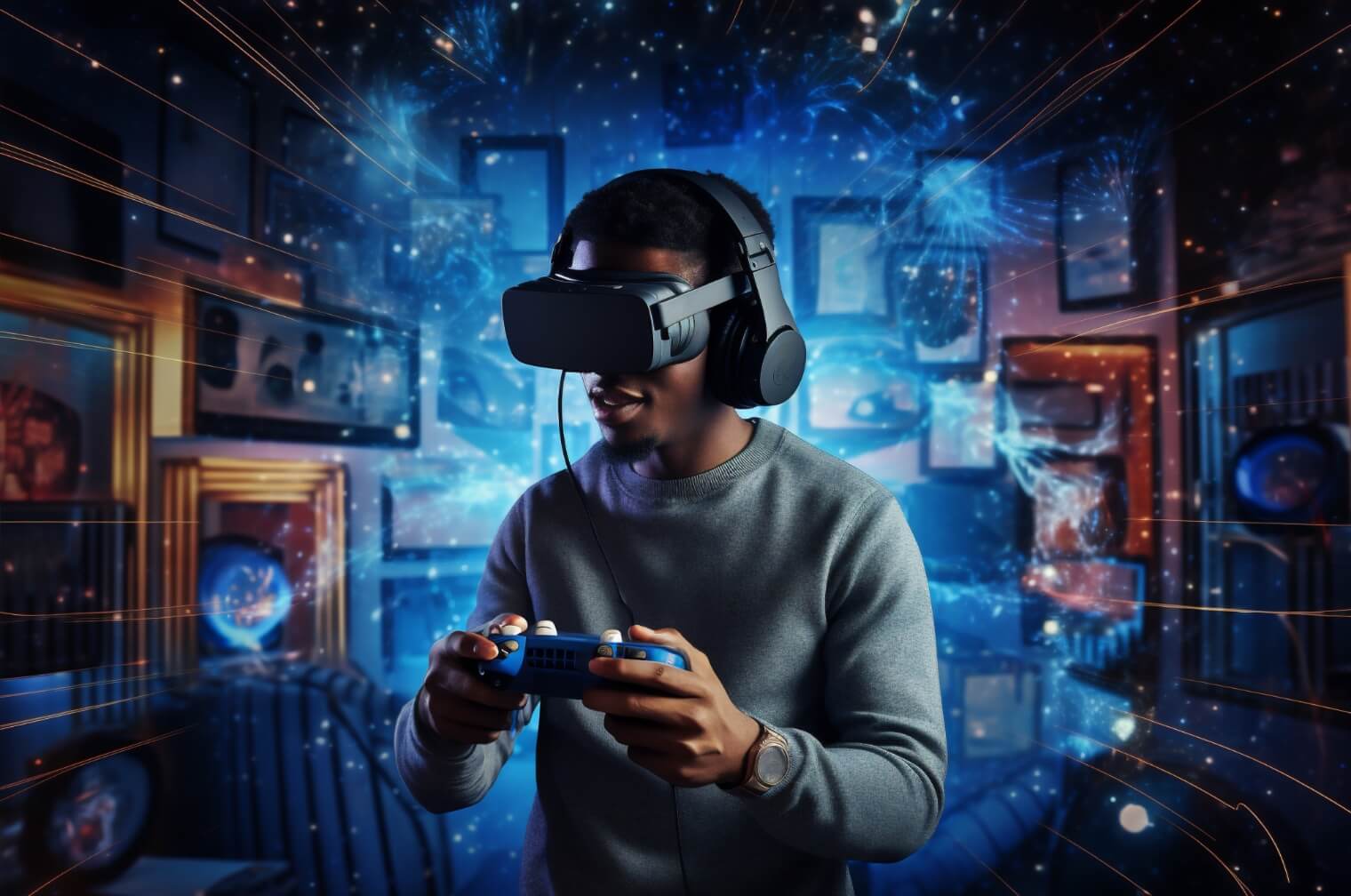Artificial Intelligence (AI) has played a role in gaming since the early arcade era, gradually evolving from basic rule-based functions in titles like Pac-Man to the advanced, dynamic systems seen in today’s expansive game universes. What was once limited to simple decision trees has now grown into powerful technology reshaping how games are designed and played.
Today, AI is a core element of game development. It helps craft deeply immersive and interactive environments by powering non-playable characters (NPCs) that behave more realistically and respond more intelligently to players. Studios like Ubisoft are already integrating AI to enable NPCs to engage in real-time, context-aware conversations with players, enhancing immersion.
But AI’s role is not limited to dialogue. It supports rapid world-building, handles massive data sets, and simulates lifelike environments, all of which significantly enhance the overall gaming experience. With AI learning and adapting in real-time, we may soon witness AI agents capable of playing alongside or even against human players with near-human intelligence.
AI is no longer a behind-the-scenes engine; it is becoming a co-creator, storyteller, and strategist, reshaping everything from game design to monetization strategies. According to Grand View Research, the global AI in gaming market is projected to surpass USD 51,259.3 million by 2030, driven by rapid advancements in machine learning, natural language processing (NLP), and cloud computing technologies.
A New Era of Game Development and Experience
The gaming industry is in the middle of a creative renaissance, powered by the capabilities of artificial intelligence. From indie developers to AAA studios, AI is being integrated at every stage of game development, making production more efficient and gameplay more intelligent.
Adaptive Gameplay: Personalized Player Journeys
Modern players want more than just beautiful graphics, they expect immersive experiences tailored to their skill levels, preferences, and in-game choices. AI enables dynamic difficulty adjustments, predictive player behavior modeling, and real-time feedback loops, resulting in hyper-personalized gameplay that evolves with the player.
Games like Left 4 Dead and Alien: Isolation have demonstrated how AI can adapt to player behavior, keeping the tension high and the experience fresh.
Smarter NPCs: From Scripted to Self-Learning
Non-player characters (NPCs) are no longer limited to rigid, predictable behaviors. AI-powered NPCs can now simulate decision-making, learning, and interaction patterns based on real-time player inputs. This creates more lifelike opponents and allies that can surprise, challenge, and engage players in new ways.
Reinforcement learning and neural networks are allowing AI to improve NPC performance without the need for continuous manual scripting.
Procedural Content Generation: Infinite Possibilities
AI enables developers to create vast game worlds, unique levels, and infinite quest lines through procedural content generation (PCG). This means players can explore game universes that are continuously evolving, with content that never feels repetitive.
Titles like Minecraft and No Man’s Sky use PCG techniques powered by AI to offer boundless exploration and player creativity.
Voice and Emotion Recognition: Real-Time Interaction
AI-driven natural language processing and emotion detection are enhancing in-game communication. Players can now speak directly to characters or in-game systems and get relevant responses. Voice-controlled commands, emotional feedback, and responsive storytelling are transforming the role of AI in player interaction.
As voice AI becomes more sophisticated, expect future games to feature AI companions that truly understand and react to human emotions.
Fraud Detection and Moderation in Online Gaming
Online multiplayer environments are vulnerable to cheating, abuse, and fraud. AI is helping detect suspicious patterns in real time—monitoring chat for toxic behavior, flagging bots, and even predicting cheating attempts.
Platforms like Valorant and Call of Duty are using AI to keep their communities safe and fair, ensuring a better experience for all players.
When AI Becomes a Game-Changer in Business Models
The impact of AI in gaming is not limited to gameplay, it is also disrupting how studios operate and monetize games.
Efficient Game Testing and QA
AI tools can automate quality assurance testing, detecting bugs, glitches, and performance issues far more efficiently than manual testers. This significantly reduces the time-to-market and allows developers to focus on creativity and polish. Predictive analytics also helps studios understand player behavior during beta testing, helping fine-tune gameplay and maximize retention before launch.
Dynamic Pricing and In-Game Monetization
AI algorithms analyze player engagement and purchase behavior to optimize in-game store offerings, suggest personalized bundles, and adjust pricing dynamically. This leads to higher conversion rates and increased revenue without compromising user experience. AI is also being used to A/B test monetization strategies and predict the lifetime value (LTV) of players.
Top Segments Driving the AI in Gaming Market
AI is being deployed across multiple platforms and genres, each with unique use cases:
- Mobile Gaming: AI on the Go: With billions of smartphone users, mobile gaming is a hotbed for AI innovation. AI helps optimize resource usage, match players in real time, and offer contextual ads without interrupting gameplay.
- Cloud-Based Gaming: Intelligence in the Cloud: AI-driven game streaming platforms can reduce latency, enhance real-time performance, and enable scalable content delivery. As cloud gaming platforms like NVIDIA GeForce Now and Xbox Cloud Gaming grow, AI will play a key role in managing player experiences globally.
- VR/AR Gaming: AI Meets Immersion: In virtual and augmented reality games, AI enables intuitive motion tracking, environment interaction, and realistic physics simulations. Combined, they offer fully immersive experiences that feel instinctive and responsive.
Key Forces Accelerating the Growth of AI in Gaming
The rise of AI in the gaming world is being powered by a combination of technological innovation and evolving player expectations. Today’s gamers want highly personalized experiences that respond to their actions, preferences, and play styles. AI enables this by adjusting in-game mechanics, environments, and storylines in real time, ensuring that every player’s journey feels unique. Additionally, the growing demand for more immersive and intelligent gameplay is pushing developers to incorporate AI at every stage of production, from voice synthesis to automated bug detection, resulting in faster development and richer content.
At the same time, advancements in cloud computing are making it easier to deliver AI-powered experiences at scale. Cloud gaming platforms rely on AI to manage server loads, reduce latency, and optimize streaming quality, making games more accessible across devices. Moreover, there is a strong industry push toward inclusivity, with AI being used to improve accessibility features such as voice commands, adaptive gameplay, and tools that support players with disabilities. Together, these trends are reshaping the gaming ecosystem and positioning AI as a transformative force in the industry.
Where AI in the Gaming Market is Headed
The AI in the gaming market is poised for a new phase of innovation, mainly due to developments in generative AI and large language models (LLMs). Studios are experimenting with AI-generated dialogue, real-time story adaptation, and even AI co-pilots for game design, paving the way for breakthroughs such as:
- Hyper-personalized gaming experiences driven by real-time learning algorithms
- AI-powered game creation tools enabling solo developers to produce AAA-quality games
- Cross-platform intelligence to sync user preferences across devices and titles
- Decentralized AI frameworks give players more control over AI behavior and content moderation
As AI capabilities expand, the line between player and game will continue to blur, unlocking deeper levels of creativity, agency, and realism.
Final Thoughts
AI is redefining what games are and what they can become. From creating smarter characters to building dynamic worlds and optimizing business operations, AI is proving to be the ultimate game-changer. For developers, publishers, and players alike, the AI in gaming market represents not just a technological leap but a creative evolution. As this market matures, those who embrace AI early will shape the next generation of unforgettable gaming experiences.
















